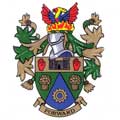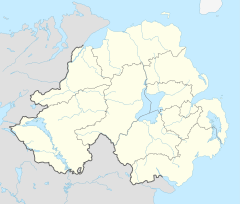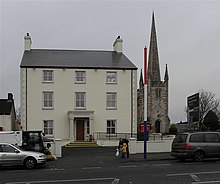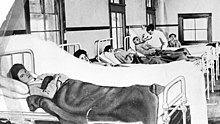Human settlement in Northern Ireland
| Cookstown | |
|---|---|
 Cookstown coat of arms Cookstown coat of arms | |
 | |
| Population | 12,546 (2021 Census) |
| Irish grid reference | H8178 |
| • Belfast | 47 miles |
| District | |
| County | |
| Country | Northern Ireland |
| Sovereign state | United Kingdom |
| Post town | COOKSTOWN |
| Postcode district | BT80 |
| Dialling code | 028 |
| Police | Northern Ireland |
| Fire | Northern Ireland |
| Ambulance | Northern Ireland |
| UK Parliament | |
| NI Assembly | |
| Website | http://www.midulstercouncil.org |
| |
Cookstown (Irish: An Chorr Chríochach, [ənˠ ˌxoːɾˠ ˈçɾʲiːxəx]) is a town in County Tyrone, Northern Ireland. It is the fourth-largest town in the county and had a population of 12,546 in the 2021 census. It, along with Magherafelt and Dungannon, is one of the main towns in the Mid-Ulster council area. It was founded around 1620 when the townlands in the area were leased by an English ecclesiastical lawyer, Dr. Alan Cooke, from the Archbishop of Armagh, who had been granted the lands after the Flight of the Earls during the Plantation of Ulster. It was one of the main centres of the linen industry west of the River Bann, and until 1956 the flax-related processes of spinning, weaving, bleaching and beetling were carried out in the town.
History

In 1609 land was leased to an English ecclesiastical lawyer, Dr Cooke, who fulfilled the covenants entered in the lease by building houses on the land. In 1628, King Charles I granted Letters Patent to Cooke permitting the holding of a twice-weekly market for livestock and flaxen goods.
In 1641, the native Irish revolted against the Planters in a bloody rebellion and the town was destroyed. The rebellion had a devastating effect on the town and development ceased for nearly a century. Over the succeeding years, the lands around Cookstown were progressively bought up by William Stewart of Killymoon until in 1671 all of Dr Cooke's lands were in the hands of the Stewart family. William Stewart and later his son James set out plans for the town soon after this. Inspired by the Wide Streets Commission's work in Dublin, they planned a new town to be built along a tree lined boulevard which was to be 135 feet (41 m) wide.
In 1802, Colonel William Stewart (James Stewart's unmarried son) approached the London architect, John Nash, and requested that he visit the area to rebuild Killymoon Castle. Nash also designed the Rectory at Lissan for the Rev John Molesworth Staples in 1807.
With the establishment of Gunning's Linen Weaving Mill, with over 300 looms, Cookstown developed in the 19th century as the local centre of the linen trade. Two railways established terminus railway stations at Cookstown - the Belfast and Northern Counties Railway (1856-1955) and the Great Northern Railway (1879-1959).
Prominent developments in the second half of the 19th century included J.J. McCarthy's Church of the Holy Trinity on Chapel Street.
On 17 June 1920, during the Irish War of Independence, the Irish Republican Army (IRA) raided the Royal Irish Constabulary (RIC) barracks in Cookstown, with help from four sympathetic RIC officers. In a brief firefight, IRA member Patrick Loughran was killed. He was the first IRA man killed on active service in what became Northern Ireland.
Cookstown Town Hall was designed by the town surveyor, Charles Geoffrey Birtwell, and built on the Burn Road by James Corrigan of Pomeroy: it was officially opened on 27 May 1953.
During the Troubles, Cookstown suffered from several bomb attacks: on 2 November 1990 an off duty soldier from the Ulster Defence Regiment was killed by a car bomb.
Cookstown Town Hall was demolished in 1998 and the Burnavon Arts and Cultural Centre opened on the site in 2000.
Places of interest
- Ardboe High Cross and Abbey (Seanchrois Ard Bó agus Ministir Naomh Colmán), one of the best examples of a 9th/10th century High cross in Ireland, is 10 mi (16 km) from Cookstown. It forms the only remaining part of an early monastery on the site.
- Other ancient sites nearby include Beaghmore stone circles and Tullyhogue Fort (beside the village of Tullyhogue), the inauguration site of the chiefs of Tyrone (Tir Eogain), the O'Neills.
- The Donaghrisk walled cemetery to the southwest of (and clearly visible from) the fort is the resting place of the O'Hagans, the chief justices of Tyrone (and as such, they presided over the inauguration ceremonies of the O'Neills).
- Lissan House lies on the outskirts of Cookstown. It is a large structure which was the home of the Staples family for 350 years.
- Killymoon Castle is about 1 mi (1.6 km) south east of Cookstown. This structure is regarded as one of Cookstown's finest pieces of architectural heritage. It was built in just over a year at a cost of £80,000 and was Nash's first Irish commission.

- Drum Manor, approximately 5 mi (8 km) from the town. Alexander Richardson, a burgess from Edinburgh, Scotland, bought the estate of Craigbalk in 1617 and built Drum Manor, which was also known Manor Richardson. Alexander's son Sir William Richardson left it to his second son, Alexander, from which the Richardsons of Drum descend. Sir William's third son, William, who inherited lands near Augher, obtained a lease for lands in the townland of Tullyreavy on the Drum Manor estate, where he built a house by the lake known as Oaklands.

- St Luaran's Church of Ireland church is on Church Street.

- James Joseph McCarthy's Catholic church, dedicated to the Holy Trinity, was constructed between 1855 and 1860 with a tower and spire at the east end.
- Derryloran Old Cemetery is a historic site of interest, located on the Sandholes Road on the outskirts of the town, which features an old graveyard and churchyard dating back to the 17th Century.
Climate
| Climate data for Lough Fea, Elevation: 225 m (738 ft), 1991–2020 normals | |||||||||||||
|---|---|---|---|---|---|---|---|---|---|---|---|---|---|
| Month | Jan | Feb | Mar | Apr | May | Jun | Jul | Aug | Sep | Oct | Nov | Dec | Year |
| Mean daily maximum °C (°F) | 6.0 (42.8) |
6.5 (43.7) |
8.3 (46.9) |
10.9 (51.6) |
13.9 (57.0) |
16.2 (61.2) |
17.6 (63.7) |
17.2 (63.0) |
15.2 (59.4) |
11.6 (52.9) |
8.4 (47.1) |
6.3 (43.3) |
11.5 (52.7) |
| Daily mean °C (°F) | 3.6 (38.5) |
3.8 (38.8) |
5.1 (41.2) |
7.3 (45.1) |
10.0 (50.0) |
12.5 (54.5) |
14.1 (57.4) |
13.9 (57.0) |
12.0 (53.6) |
8.9 (48.0) |
5.9 (42.6) |
3.9 (39.0) |
8.4 (47.1) |
| Mean daily minimum °C (°F) | 1.1 (34.0) |
1.1 (34.0) |
2.0 (35.6) |
3.6 (38.5) |
6.1 (43.0) |
8.8 (47.8) |
10.6 (51.1) |
10.5 (50.9) |
8.8 (47.8) |
6.1 (43.0) |
3.4 (38.1) |
1.5 (34.7) |
5.3 (41.5) |
| Average precipitation mm (inches) | 140.3 (5.52) |
111.1 (4.37) |
106.4 (4.19) |
93.4 (3.68) |
88.3 (3.48) |
96.6 (3.80) |
102.0 (4.02) |
116.1 (4.57) |
102.9 (4.05) |
128.3 (5.05) |
141.1 (5.56) |
144.9 (5.70) |
1,371.2 (53.98) |
| Average precipitation days (≥ 1.0 mm) | 19.3 | 16.6 | 16.6 | 14.5 | 14.2 | 13.8 | 15.7 | 16.2 | 14.7 | 17.5 | 18.8 | 19.4 | 197.2 |
| Source: Met Office | |||||||||||||
Politics
In elections for the Westminster Parliament and the Northern Ireland Assembly it is part of the Mid Ulster constituency.
The local authority, Cookstown District Council, was established in 1973, and included part of County Londonderry, notably the villages of Moneymore, The Loup and Ballyronan.
As part of the Local Government Reform (NI) Cookstown District Council merged with Dungannon and South Tyrone Borough Council and Magherafelt District Council to form a larger Mid-Ulster District Council in 2015.
Townlands
The following is a list of townlands within Cookstown's urban area, alongside their likely etymologies:
- Clare (from Clár meaning "level land")
- Cookstown (an English name from Alan Cooke, bishop of Armagh)
- Coolkeeghan (from Cúil Caocháin meaning "Keighen's corner")
- Coolnafranky (from Cúil na Francaigh meaning "corner of the rats" or "French")
- Coolnahavil (from Cúil na hAbhaill meaning "corner of the orchard")
- Coolreaghs (from Cúil Riach meaning "grey corner")
- Gortalowry (from Gort an Leamhraigh meaning "field of the elm place")
- Loy (from Láigh meaning "hill")
- Maloon (from Magh Luan meaning "plain of the lambs")
- Monrush (from Móin Rois meaning "wooded peatland")
- Sullenboy (from Sailean Buí meaning "yellow willows")
- Tullagh (from Tulach meaning "hilltop")
Cookstown townland
Cookstown townland itself is situated in the historic barony of Dungannon Upper and the civil parish of Derryloran and covers an area of 217 acres.
The population of the townland increased overall during the 19th century:
| Year | 1841 | 1851 | 1861 | 1871 | 1881 | 1891 |
|---|---|---|---|---|---|---|
| Population | 27 | - | 16 | 123 | 119 | 93 |
| Houses | 5 | 1 | 4 | 23 | 28 | 22 |
Sport
Motorcycling
The town plays host to the Cookstown 100 Road Races, the longest running motorcycle road race in Ireland. Held in April of each year the races are seen as the curtain raiser to the Irish National Road Racing Championship.
Gaelic Football
Cookstown Fr. Rock's, the local Gaelic Athletic Association club, won the All-Ireland Intermediate Club Football Championship in 2013.
Association Football
Local association football clubs include Cookstown Olympic F.C. (an intermediate-level football club), Mid-Ulster Ladies F.C. (a women's football club), Killymoon Rangers F.C., Coagh United F.C. and Sofia Farmer F.C. (clubs in the Cookstown District that play in the Ballymena & Provincial Intermediate League).
Hockey
Cookstown Hockey Club is the town's field hockey team.
Demography
19th century population
The population of the town increased during the 19th century:
| Year | 1841 | 1851 | 1861 | 1871 | 1881 | 1891 |
|---|---|---|---|---|---|---|
| Population | 3006 | 2993 | 3257 | 3501 | 3870 | 3841 |
| Houses | 550 | 576 | 600 | 728 | 822 | 835 |
Cookstown is classified as a medium town (i.e. with population between 10,000 and 18,000 people) by the Northern Ireland Statistics and Research Agency (NISRA).
2021 Census
| National Identity of Cookstown residents (2021) | ||||
|---|---|---|---|---|
| Nationality | Per cent | |||
| British | 31.7% | |||
| Irish | 31.3% | |||
| Northern Irish | 28.6% | |||
On census day in 2021 there were 12,546 people living in Cookstown. Of these:
- 21.05% were aged under 16, 63.93% were aged between 16 and 65, and 15.03% were aged 66 and over.
- 51% were female, and 49% were male.
- 56.21% (7,053) were from a Catholic background, and 34.34% (4,308) were from a Protestant or other Christian background, 1.12% were from other religious backgrounds and 8.33% (1,045) had no religious background.
- 31.68% indicated they had a British national identity, 31.29% had an Irish national identity, and 28.58% had a Northern Irish national identity. (respondents could select more than one national identity).
- 14.55% had some knowledge of Irish, and 8.88% had some knowledge of Ulster-Scots.
2011 Census
On census day (27 March 2011) there were 11,599 people living in Cookstown. Of these:
- 98% were from the white ethnic group
- 56% were from a Catholic background, and 39% were from a Protestant or other Christian background
- 40% indicated that they had a British national identity, 30% had a Northern Irish national identity, and 28% had an Irish national identity (respondents could choose more than one)
2001 Census
On census day (29 April 2001) there were 10,646 people living in Cookstown. Of these:
- 26.0% were aged under 16 years and 15.6% were aged 60 and over
- 49.7% of the population were male and 50.3% were female
- 52.8% were from a Catholic background and 45.1% were from a Protestant background
- 3.9% of people aged 16–74 were unemployed.
Education
Secondary schools serving the area include Cookstown High School and Holy Trinity College, Cookstown.
At third level, the Loughry Campus of the College of Agriculture, Food and Rural Enterprise is 2 mi (3.2 km) south of Cookstown. South West College (a technical college) is also in the area.
Healthcare
The first community hub for primary care in the province is to be established in the town, backed by four local GP practices and the health board. It is to incorporate scanning facilities, a minor surgery suite, a pharmacy, out-of-hours consultations and community healthcare partnerships, with the possibility of developing supported living accommodation for older people.
Notable people
Arts
- Jimmy Cricket - comedian
- Nick Laird - poet and novelist
- Eamonn McCrystal - singer and broadcaster
- Owen O'Neill - writer, actor, director, and comedian
- Oliver Sheppard (1865-1941) - sculptor, born in Cookstown
- Jonathan Swift - stayed at Loughry Manor as a guest of the Lindsay family while writing Gulliver's Travels (published in 1726)
- Lias Saoudi - Fat White Family musician, grew up in Cookstown
Business
- Finbarr O'Neill - former CEO of J.D. Power.
Sport
- Kenny Acheson - racing driver
- David Ames - Olympian 2016, 2020 and 2024 (Captain), Great Britain
- Jacqueline Burns - footballer, Northern Ireland women's national football team
- Stuart Dallas - footballer, Northern Ireland Team
- Terry Devlin - footballer, EFL League One, Portsmouth F.C.
- Aaron Hughes - footballer, Northern Ireland Team
- Owen Mulligan - Tyrone GAA footballer
- Ian Sloan - 2016 and 2020 Olympian, Great Britain
- Martin Sloan - field hockey, Ireland men's national field hockey team captain of 1990 Men's Hockey World Cup team
Politics
- William Craig - politician, founder of Ulster Vanguard, born in Cookstown
- Bernadette Devlin - Republican Socialist political activist, raised in a small housing estate called Rathbeg

Medical
- Major-General Sir Richard Havelock Charles, 1st Baronet (1858–1934) - medical doctor, Serjeant Surgeon to King George V
- Mary Mallon, aka Typhoid Mary
See also
References
- "Cookstown District Council". Archived from the original on 4 September 2012. Retrieved 15 February 2008.
- "Ulster-Scots guide to Beaghmore stone circles – Department of the Environment" (PDF). Archived (PDF) from the original on 1 October 2015. Retrieved 17 July 2012.
- "An Chorr Chríochach/Cookstown". Placenames Database of Ireland (logainm.ie). Department of Tourism, Culture, Arts, Gaeltacht, Sport and Media (Ireland) and Dublin City University. Retrieved 12 November 2020.
- ^ "Settlement 2015". NISRA. Retrieved 18 August 2023.
- ^ Coyle, Cathal (2014). The Little Book of Tyrone. History Press. p. 49. ISBN 978-0750962841.
- "1803 - Killymoon Castle, Cookstown, County Tyrone". Archiseek. 29 November 2012. Retrieved 29 November 2022.
- "1807 - Lissan Rectory, Cookstown, County Tyrone". Archiseek. 13 November 2012. Retrieved 29 November 2022.
- ^ "Cookstown Directory". 1880. Retrieved 29 November 2022.
- ^ "1860 - Holy Trinity Church, Cookstown, County Tyrone". Archiseek. 15 February 2017. Retrieved 29 November 2022.
- Hezlet, Sir Arthur (1972). The 'B' Specials. London: Tom Stacey. p. 10. ISBN 0-85468-272-4.
- Lawlor, Pearse. The Outrages: The IRA and the Ulster Special Constabulary in the Border Campaign. Mercier Press, 2011. pp.28-29
- Chronology of Irish History 1919 - 1923 - June 1920 Archived 5 September 2007 at the Wayback Machine Seamus Fox. 2008. Dublin City University.
- "Cookstown Town Hall" (PDF). Mid-Ulster Local History Journal. p. 40. Archived (PDF) from the original on 30 November 2022.
- "Political violence during the Troubles: 1990-1994". Alpha History. 15 September 2017. Retrieved 29 November 2022.
- "Town hall to be demolished". The Irish Times. 10 September 1998. Retrieved 29 November 2022.
- "Annual Report 2000/21" (PDF). Arts Council of Northern Ireland. p. 7. Archived (PDF) from the original on 28 August 2015. Retrieved 29 November 2022.
- O'Neill, B., ed. (2002). Irish Cathedrals, Churches and Abbeys. London: Caxton Editions. p. 63.
- "Beaghmore Stone Circle Complex". Megalithics. Retrieved 1 December 2007.
- "Tullaghoge Fort". Discover Northern Ireland. Retrieved 29 November 2022.
- "Donaghrisk Churchyard, Cookstown, Co Tyrone". YouTube. Retrieved 29 November 2022.
- Lehane, Brendan (2001). The Companion Guide to Ireland. Companion Guides. p. 437. ISBN 978-1900639347.
- "Killymoon Castle". The Chrono Centre - Queens University Belfast. Archived from the original on 18 July 2011.
- ^ Alexander Richardson Archived 3 November 2012 at the Wayback Machine, founder of the Drum estate. Ancestry.com user page.
- "St Luaran's Church". Cookstown Parish. Archived from the original on 13 June 2012. Retrieved 19 December 2012.
- "Derryloran Old Church Cookstown". My Cookstown.
- "Lough Fea Climate". Met Office. Retrieved 1 May 2024.
- "Statement of Persons Nominated – Mid Ulster". Archived from the original on 8 April 2022. Retrieved 8 April 2022.
- Transport Year Book 2006. Stationery Office. 18 November 2005. p. 66. ISBN 9780117035850. Retrieved 30 November 2022.
- "Electoral Areas". Mid-Ulster District Council. Retrieved 30 November 2022.
- "Northern Ireland Placenames Project". placenamesni.org. Archived from the original on 1 October 2010. Retrieved 27 August 2012.
- "Townlands of County Tyrone". IreAtlas Townland Database. Archived from the original on 28 June 2015. Retrieved 19 March 2013.
- ^ "Census of Ireland 1891". Enhanced Parliamentary Papers on Ireland. Retrieved 22 March 2013.
- "Census of Ireland 1851". Enhanced Parliamentary Papers on Ireland. Retrieved 19 March 2013.
- https://roadracingnews.co.uk/ignore-the-doom-mongers-cookstown-100-will-run/
- https://roadracingnews.co.uk/tag/cookstown-100/
- "All-Ireland Club IFC final: All-Ireland glory for Cookstown". Hogan Stand. 9 February 2013. Retrieved 27 February 2013.
- "All-Ireland Club IFC final: All-Ireland glory for Cookstown". Hogan Stand. 9 February 2013. Retrieved 27 February 2013.
- "CYFC 1sts vs Cookstown Olympic F.C. (Cookstown Cup)". YouTube. Retrieved 30 November 2022.
- McWilliams, Nikki (24 May 2014). "Referee decides to end match 17 minutes early". Belfast Telegraph. Retrieved 19 January 2016.
- "Killymoon Rangers hoping to add to 50th anniversary celebrations with cup success". Belfast Live. 5 May 2022. Retrieved 30 November 2022.
- "Pre-season: v Sofia Farmer". YouTube. Retrieved 30 November 2022.
- "Cookstown triumph in Kirk final". BBC Sport. 26 December 2006. Retrieved 2 June 2007.
- "Census of Ireland 1851". Enhanced Parliamentary Papers on Ireland. Archived from the original on 13 January 2013. Retrieved 22 March 2013.
- "Statistical Classification and Delineation of Settlements" (PDF). NI Statistics and Research Agency (NISRA). February 2005. Table 3 / Band C - Large Town. Archived (PDF) from the original on 1 June 2018. Retrieved 26 September 2018.
- ^ "National Identity (British)". NISRA. Retrieved 18 August 2023.
- ^ "National Identity (Irish)". NISRA. Retrieved 18 August 2023.
- ^ "National Identity (Northern Irish)". NISRA. Retrieved 18 August 2023.
- "Age". NISRA. Retrieved 4 July 2024.
- "Sex (MS-A07)". NISRA. Retrieved 4 July 2024.
- "Religion or religion brought up in". NISRA. Retrieved 15 August 2023.
- "Knowledge of Irish (MS-B05)". NISRA. Retrieved 4 July 2024.
- "Knowledge of Ulster-Scots (MS-B08)". NISRA. Retrieved 4 July 2024.
- "Census 2011 Population Statistics for Cookstown Settlement". Northern Ireland Statistics and Research Agency (NISRA). Archived from the original on 23 May 2021. Retrieved 26 September 2021.
 This article contains quotations from this source, which is available under the Open Government Licence v3.0. © Crown copyright.
This article contains quotations from this source, which is available under the Open Government Licence v3.0. © Crown copyright.
- "NI Neighbourhood Information Service NISRA". Archived from the original on 6 August 2007. Retrieved 18 December 2005.
- "Cookstown High School". Education Authority Northern Ireland. Retrieved 30 November 2022.
- "Holy Trinity College, Cookstown". Education Authority Northern Ireland. Retrieved 30 November 2022.
- "CAFRE (College of Agriculture, Food & Rural Enterprise) - Loughry Campus". NI Direct. Retrieved 30 November 2022.
- "South West College". The Alliance for Sustainable Leadership in Education. Retrieved 30 November 2022.
- "£8m health village plan 'well advanced'". Mid Ulster Mail. 9 May 2018. Archived from the original on 26 May 2018. Retrieved 25 May 2018.
- "Cookstown-born comic Jimmy Cricket awarded knighthood by the Pope". Northern Ireland World. 19 September 2015. Retrieved 30 November 2022.
- "Cookstown poet a Queen's Professor". Tyrone Courier. 14 May 2019. Retrieved 30 November 2022.
- McGurk, John (4 September 2012). "Cookstown singer Eamonn McCrystal set for stardom in US". Belfast Telegraph. Retrieved 30 November 2022.
- O'Neill, Emma (5 September 2009). "Owen O'Neill is Cookstown's Comedy King". CultureNorthernIreland. Retrieved 1 October 2013.
- "Sheppard, Oliver". Dictionary of Irish Biography. Retrieved 30 November 2022.
- Evans, Rosemary (1994). Ireland. Moorland. p. 123. ISBN 978-1564404770.
- "How Fat White Family's studied his way out of a town he hated". Loud and Quiet. 9 April 2019. Retrieved 10 December 2022.
- Maynard, Micheline (17 June 2001). "Private Sector; To the Rescue, Quietly, at Hyundai". The New York Times. ISSN 0362-4331. Retrieved 22 July 2022.
- "My Journey: David Ames". YouTube. Retrieved 30 November 2022.
- "Jacqueline gets gold". Cookstown High School. 6 June 2014. Retrieved 30 November 2022.
- "Stuart Dallas". irishfa.com. Irish Football Association. Archived from the original on 14 April 2021. Retrieved 11 April 2021.
- Niall Gartland (28 July 2023). "Terry Devlin – from Cookstown to Pompey". WeAreTyrone. Retrieved 26 September 2023.
- Coyle, Cathal (2014). The Little Book of Tyrone. History Press. p. 126. ISBN 978-0750962841.
- "Mulligan ready to keep working to bring more success to Tyrone". The Irish News. 28 September 2021. Retrieved 30 November 2022.
- "Ian Sloan eyes Great Britain coaching job as he makes early plans for life after fruitful playing career". The Belfast Telegraph. 3 December 2020. Retrieved 30 November 2022.
- "Cookstown hockey stars show their class at Masters tournament". 23 September 2014. Retrieved 30 November 2022.
- "Biographies of all Members of Parliament in the Northern Ireland House of Commons" Archived 26 February 2019 at the Wayback Machine, Election Demon
- "People: Bernadette McAliskey: 'I am astounded I survived. I made mad decisions'". The Irish Times. 22 September 2016. Retrieved 30 November 2022.
- "Charles, Sir (Richard) Havelock". Dictionary of Irish Biography. Retrieved 30 November 2022.
- "On This Day: "Typhoid" Mary Mallon was born in Co Tyrone". Irish Central. 23 September 2022. Retrieved 30 November 2022.
External links
![]() Media related to Cookstown at Wikimedia Commons
Media related to Cookstown at Wikimedia Commons
| Towns in Northern Ireland | ||
|---|---|---|
| List of towns by population | ||
| Large |  | |
| Medium | ||
| Small | ||
| Italics denote settlements that are classed as towns but also have city status
| ||